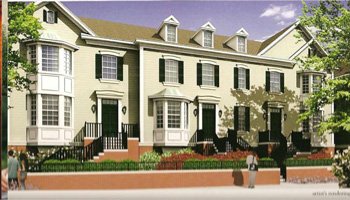
Within the US and Canada, sales of townhouses are 'going to town' (moving ahead in a vigorous manner). The term 'townhouse' has varied meanings in different countries. Historically in the UK and Ireland, 'townhouse' referred to the residence of a member of the aristocracy in a capital or major city. Famous townhouses are 10 Downing Street, residence of Prime Minister David Cameron, or Clarence House, home of the late Queen Elizabeth, the Queen Mother, and now the residence of Charles, Prince of Wales.
What are Townhouses?
Today in North America, this type of housing (either single-family or multiple-family dwellings) has a small "footprint." Usually, a townhouse is within minutes (either walking or with public transportation) of a city's business and industrial areas. Townhouses have been compared to a compromise between a condo and a regular home.
This housing category can include homes in the luxury market as well as more affordable houses. Superb examples of luxurious townhouses can be found in New York, Boston, Chicago, Toronto, Philadelphia, and San Francisco.
Why do People Buy Townhouses?
Part of the current appeal of townhouses is the wide range of prices. There is a townhouse for every budget and all age groups. Townhouses interest everyone from first-time buyers to empty-nesters who are downsizing to a smaller home. A first-time home buyer views a townhouse as an affordable alternative to a detached house. Building fees can cover issues such as snow removal, landscaping, or maintenance of the building's exterior.
Sometimes there is more demand for townhouses than can be supplied by the market. Wendy Jabusch, general manager of Hawthorne Homes, speaks about Canadian real estate and townhouses.
"Recent research shows that available townhome product -- homes started or available for pre-sale -- is only 14 per cent of the new construction market. The remaining 86 per cent of multi-family product is apartments," says Wendy Jabusch of Hawthorne Homes.
What does the Future Hold for Townhouses?
There has been a recent increase in townhouse developments. Construction starts of townhouses counted in at 250 in Calgary, Alberta during October, 2010. According to Canada Mortgage and Housing Corporation, that statistic showed the strongest month in 21 years for townhouse starts. Of course, there were fewer new townhouse constructions in 2009 because builders were working though units already in production.
Home buyers gravitate to townhouses for several reasons. Townhouses offer good value, attractive design, and lifestyle benefits. President and partner Tim Logel of Cardel Lifestyles says that he has found that townhouses have maintained their popularity since Cardel's first development in 2002. Logel is optimistic about townhouse sales in the coming year.
"I expect 2011 to be a strong year for townhome sales as affordability and the job market improves in Calgary," says Tim Logel of Cardel Lifestyles.
Manhattan Townhouses
New York City townhouses never lose their appeal. It is easier to get financing for a city townhouse than a NYC co-op. Generally, lenders look upon a Manhattan townhouse purchase as a wise investment. If you buy a townhouse as an investment, rental income can take care of the monthly mortgage payment.
Are You Planning To Buy A Townhouse?
Image courtesy of activerain.com